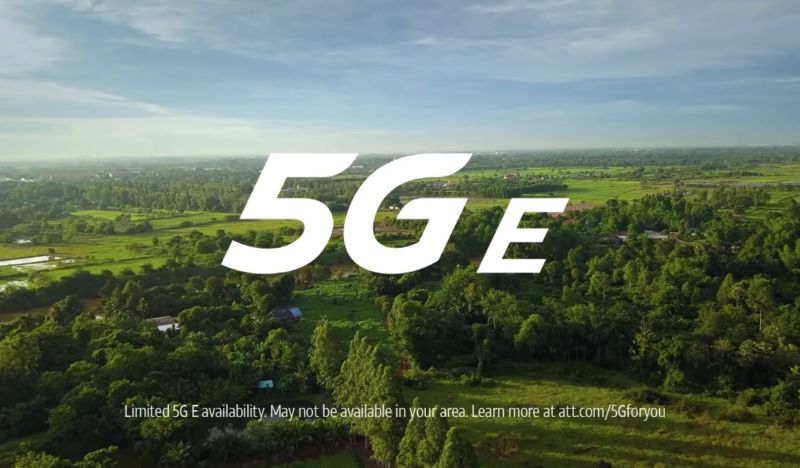
AT&T and different cell carriers try to cover detailed 5G maps from the general public regardless of continually touting the supposed tempo and breadth of their 5G rollouts.
With the Federal Communications Fee planning to require carriers to submit extra correct knowledge about broadband deployment, AT&T and the cell business's high foyer group are urging the FCC to exclude 5G from the upgraded knowledge assortment.
"There may be broad settlement that it's not but time to require reporting on 5G protection," AT&T informed the FCC in a filing this week.
As proof of that "broad settlement," AT&T cited feedback by CTIA—the cell business foyer group that represents AT&T, Verizon, T-Cellular, and Dash. "[A]s CTIA factors out, service requirements for 5G are nonetheless rising, precluding reporting of service-level protection for 5G networks (apart from the 5G-NR submissions already required)," AT&T wrote.
That is a reference to 5G New Radio, the worldwide normal for 5G. CTIA told the FCC in September that it would not object to the 5G-NR requirement as a result of "the 5G-NR requirements are technical ones; they don't set up what service stage customers ought to have the ability to anticipate when utilizing 5G."
However CTIA stated requiring greater than that might be "untimely" as a result of "business consensus continues to be rising round how greatest to measure the deployment of this still-nascent know-how." Verizon additionally told the FCC in September that "adoption of standardized parameters is untimely" for 5G.
Calling 5G a "still-nascent know-how" that may't correctly be measured but raises the query of why carriers have been telling the FCC and public that 5G is guaranteed to revolutionize modern life and that carriers want regulatory favors to hurry its rollout. The cell business did not assume it was "untimely" for the US authorities to preempt native regulation of 5G deployments, an motion FCC Chairman Ajit Pai took more than a year ago.
The brand new business filings had been beforehand detailed in articles by Light Reading and Vice.
The FCC in October voted to require house Web suppliers to submit geospatial maps of the place they supply service as an alternative of merely reporting which census blocks they provide service in. The FCC hasn't but imposed such intensive necessities on cell suppliers, however that is as a result of it hasn't completed its investigation into complaints that Verizon and T-Mobile lied in regards to the extent of their 4G protection. The FCC is searching for public touch upon the best way to incorporate cell protection into the brand new mapping system.
T-Cellular has printed maps of its 5G protection, however an FCC requirement might power carriers to supply extra correct and detailed knowledge than they're prepared to share voluntarily.
Extra AT&T complaints
AT&T's submitting this week complained that "requiring 5G protection maps on this early stage of 5G deployment might reveal delicate details about cell web site areas and even buyer areas, in instances the place 5G is being deployed in high-band spectrum for particular enterprise clients."
AT&T additionally desires limits on necessities for reporting the pace of non-5G networks. AT&T stated that carriers ought to solely need to report two pace tiers: one for every part under 5Mbps obtain and 1Mbps add speeds, and one other tier for every part at or above 5Mbps and 1Mbps.
AT&T claims it would "provide 5G nationwide within the first half of 2020," however AT&T additionally misled customers about 5G availability by renaming a large portion of its 4G network, calling it "5G E." Verizon has been touting its plan to have 5G in parts of 30 cities by the tip of 2019, whereas T-Mobile has claimed it has a greater 5G plan than AT&T or Verizon.
Truly reporting detailed 5G maps would present simply how sparse the networks are, even in cities the place it has been rolled out. Early deployments have centered on the millimeter-wave variant of 5G, which is the one kind of 5G anticipated to supply considerably quicker speeds than 4G.
This high-frequency spectrum can vastly enhance cell speeds as a result of there's extra of it out there. However the increased frequencies are simply blocked, and so they do not journey so far as low-frequency alerts. Verizon lately bragged about providing 5G in 13 NFL stadiums, however its 5G network isn't capable of overlaying all of the seating areas in any a type of stadiums.
Shoppers mustn't anticipate to get a consistent millimeter-wave 5G signal as they transfer by means of a metropolis any time quickly, and carriers admit that clients in rural areas could by no means get millimeter-wave 5G. Exterior densely populated areas, Verizon says that 5G might be extra like "good 4G."
